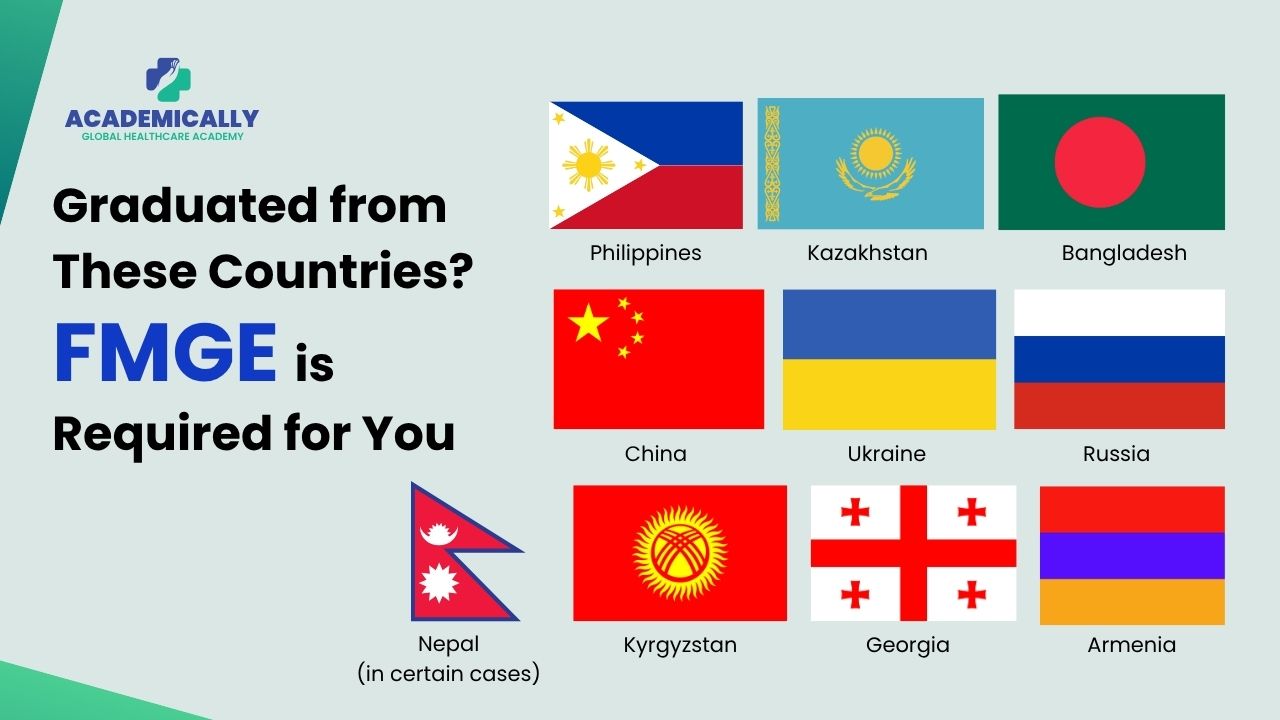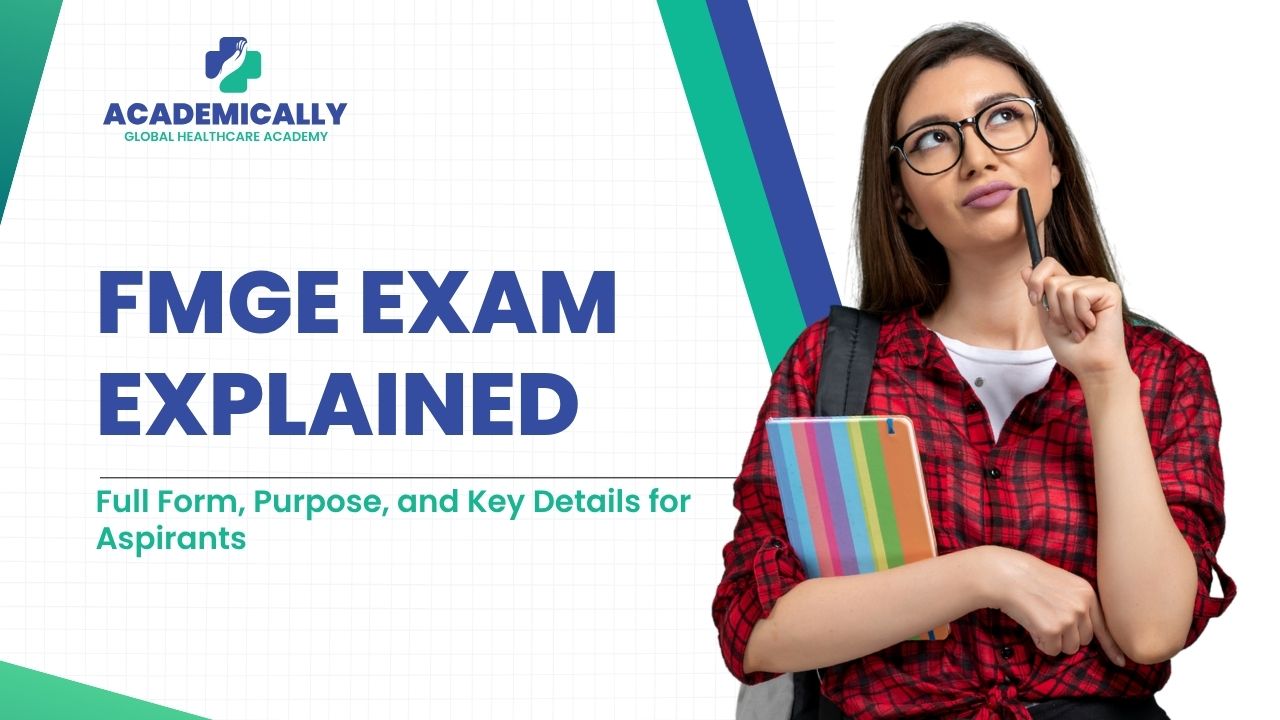What is the full form of FMGE?
FMGE stands for Foreign Medical Graduate Examination. It is the only way for foreign medical graduates to practice in India. After clearing this exam, they are allowed to practice as a doctor.
Who conducts FMGE?
Let’s understand which body conducts FMGE. It is held by the National Board of Examinations (NBE), which comes under the Ministry of Health and Family Welfare, Government of India.
What is the purpose of FMGE?
The main purpose of FMGE is not the ranking or marks, you are not competing with anyone but yourself. You just need to score 150 out of 300.
Its main goal is that you need to prove your clinical and theoretical knowledge, that you can treat patients in India.
Why is FMGE Necessary?
FMGE is a highly necessary exam because India is a culturally diverse country with a complex healthcare system. In different countries, the education standards may vary, some provide high-quality education standards, and others may not follow them thoroughly.
FMGE stands as a bridge between foreign students and India, allowing them to practice in India. Crossing that bridge is mandatory to ensure eligibility to practice in India.
| Criteria | FMGE Exam |
| Full Form | Foreign Medical Graduate Examination |
| Conducting Body | National Board of Examinations (NBE) |
| Mode | Online (Computer-Based Test) |
| Sessions | Twice a year (June & December) |
| Eligibility | Indian/OCI MBBS graduate from abroad |
| Passing Criteria | 150 out of 300 marks |
| Negative Marking | None |
| Result | Declared on NBE website |
Purpose and History of FMGE
A question that pops up in your mind would be: “Why does FMGE exist?” To answer that, we need to go back in history to find the purpose for which it was made.
It all goes back to a fundamental principle in medicine: patient safety comes first.
Before 2002, any Indian student who graduated from a foreign country could come to India and directly practice medicine without any screening test.
Of course, it was relatively easy for the student, but it raised concerns about students who study in colleges that are poorly regulated and do not provide quality education.
As a result, those doctors practiced poorly and put the patient's life at risk, which is why this exam was introduced.
| Purpose | Explanation |
| Safety | Ensures patients are treated by competent, trained professionals |
| Standardization | Aligns foreign education with Indian MBBS standards |
| Legitimacy | Screens degrees from unverified or unregulated institutions |
| Regulation | Provides a legal framework for foreign-trained doctors to practice |
FMGE Eligibility Criteria – Do You Qualify?
Before just directly diving into it, first, make sure if you are eligible to sit for the exam or not. Each year, many candidates are disqualified due to not being able to meet the eligibility criteria.
Let’s help you avoid that mistake.
To be eligible for the FMGE, you must satisfy all of the following criteria:
1. You must be an Indian citizen or an Overseas Citizen of India (OCI)
Only Indian citizens or OCI can apply for this exam. If you are a foreign citizen, you cannot apply for this exam; you’ll need to follow a different process.
2. You must have a primary medical qualification
The medical qualification must be completed full-time, outside of India, and it should be a recognized degree that allows you to practice in that country as well.
3. The medical qualification must be confirmed by the Indian Embassy
The Indian Embassy, situated in the country where you studied, should verify that the university is recognized by the country's regulatory body and meets the relevant standards.
4. The university should be listed in WDOMS
5. If you have done your MBBS from these countries:
China, Ukraine, Russia, Kyrgyzstan, Georgia, Nepal (in certain cases), Armenia, Bangladesh, Kazakhstan, Philippines

Required Documents at the Time of Application
Here’s a checklist of documents you’ll need to apply:
| Document | Description |
| Passport | Must show entry and exit dates for your course duration |
| Degree Certificate | Final MBBS degree or provisional degree from your university |
| Eligibility Certificate | Mandatory if you took admission after 15 March 2002 |
| Internship Certificate | If completed as part of your program abroad |
| WDOMS Printout | Page confirming your college is listed in the World Directory |
| Indian Embassy Letter | Proof your degree is recognized in the country of issue |
| Photo and Signature | As per NBE’s specifications (usually JPEG, under 80KB) |
Common Eligibility Mistakes (That Can Ruin Your Application)
1. Not having the Eligibility Certificate
If you joined your foreign MBBS course after March 2002 and don’t have the EC, you will not be allowed to sit for FMGE even if you’ve already graduated.
2. Studying in a non-WDOMS-listed university
Some students unknowingly enroll in colleges that are not internationally listed. Unfortunately, NMC rejects degrees from such institutions.
3. Incomplete or split education
Transferring from one country to another midway through your course (e.g., first 3 years in China, last 3 in Georgia) can make your degree invalid for FMGE.
4. Inadequate internship or clinical rotation
Some universities do not offer proper clinical exposure. If you cannot produce a valid internship certificate, you may be asked to repeat your internship in India.
Eligibility Checklist
| Requirement | Mandatory |
| Indian/OCI Nationality | Yes |
| MBBS Degree from a Foreign Country | Yes |
| The university is listed in WDOMS and NMC | Yes |
| Eligibility Certificate (post-2002) | Yes |
| Completed Course & Internship | Yes |
| Recognized by the Indian Embassy | Yes |
Who are Exempted from FMGE?
There is a small group of students who are exempt from FMGE; usually, these are students from countries that maintain a high standard of education in their healthcare system.
You Don’t Need FMGE If:
- If you have completed your MBBS degree from the U.S.A., UK, Canada, Australia, and New Zealand.
- If your MBBS degree is recognized by the local regulatory authority of the country.
- You are registered to practice in the country.
If you are fulfilling these criteria, you don't have to qualify for FMGE, you can directly register yourself in India.
FMGE 2025 – Exam Dates & Timeline (What to Expect and When)
The most important part of preparing for an exam is to know its dates and timelines; many students don't know that FMGE is held only twice a year: June & December
As a result, they might miss the application deadline and regret it later on.
Below is a realistic, experience-based breakdown of the FMGE 2025 schedule based on recent patterns from NBE.
FMGE June 2025 Session (Tentative Timeline)
| Activity | Expected Date |
| Notification Release | First week of April 2025 |
| Online Application | 1st or 2nd week of April 2025 |
| Application Deadline | Last week of April 2025 |
| Correction Window | Early May 2025 |
| Admit Card Release | Around 12–15 June 2025 |
| Exam Date | 22 or 29 June 2025 (Sunday likely) |
| Result Declaration | Mid-July 2025 |
FMGE December 2025 Session (Tentative Timeline)
| Activity | Expected Date |
| Notification Release | Mid-October 2025 |
| Online Application | 3rd week of October 2025 |
| Application Deadline | 2nd week of November 2025 |
| Correction Window | End of November 2025 |
| Admit Card Release | Around 14–17 December 2025 |
| Exam Date | 21 or 28 December 2025 (Sunday likely) |
| Result Declaration | Mid-January 2026 |
Important Things to Keep in Mind
1. The Dates Are Subject to Change
2. Don’t Wait for the Last Day
One huge mistake candidates make is waiting until the last minute to fill out the application. There is a high chance of the website crashing or the server hanging due to heavy traffic. Always complete your application before.
3. Correction Window Is a Lifesaver
Mistakes are bound to happen, such as spelling errors and uploading the wrong certificates, among many others. The correction window enables you to correct mistakes and save your application from being rejected.
4. Admit Card Is Your Gate Pass
When the notification is released, download your admit card from the NBE login dashboard and print it, and it should be clear, and don’t forget to bring it along with you on the exam day.
How to Apply for FMGE – A Simple Guide
Here is a simple step-by-step process to apply for the FMGE exam:
Step 1: Register on the NBE Website
Step 2: Fill the Application Form
The most important part is to fill out the application form fully and carefully. The information you need to fill in will be as follows:
- Personal details (name, address, category)
- Academic info (college, country, course duration)
- Passport and eligibility certificate details
- Internship status and prior FMGE attempts (if any)
Step 3: Upload Documents
Upload clear, scanned copies of the following:
- Recent passport-size photo and signature
- MBBS degree or provisional certificate
- Eligibility certificate (if needed)
- Passport (with visa stamps)
- Internship certificate (if done abroad)
- Screenshot of WDOMS listing for your college
All files should be in PDF or JPEG, under 1–2 MB each.
Step 4: Pay the Exam Fee
- Fee: ₹6195
- Payment: Online through debit/credit card or net banking
You’ll receive an auto-confirmation after successful payment.
Step 5: Final Submission
Review your form, hit Final Submit, and download the confirmation page. Print a copy you’ll need it later for documentation.
Admit Card & Exam Day
Your admit card will be released 7–10 days before the exam. Log in to your dashboard and download it. Make sure to carry:
- A color printout of the admit card
- A valid photo ID (like Aadhaar or passport)
Quick Tips:
- Don’t wait till the last date to apply.
- Keep documents ready in advance.
- Double-check all uploads for clarity and accuracy.
FMGE Exam Pattern – Quick Overview
The FMGE is a qualifying exam, not a competitive one. Still, knowing the structure helps you prepare better.
- Total Questions: 300
- Type: Multiple Choice (MCQs)
- Mode: Online (Computer-Based Test)
- Sections: 2 (Part A and Part B – 150 questions each)
- Time: 2.5 hours per part + 45 min break
- Language: English only
- Passing Score: 150/300
- Negative Marking: None
FMGE Syllabus – Subject Overview
Here is a syllabus overview, learn about what subjects you’ll need to prepare for:
| Category | Subjects Included |
| Pre-Clinical | Anatomy, Physiology, Biochemistry |
| Para-Clinical | Pathology, Microbiology, Pharmacology, Forensic Medicine, Community Medicine (PSM) |
| Clinical | Medicine, Surgery, Obstetrics & Gynecology, Pediatrics, Ophthalmology, ENT, Dermatology, Psychiatry, Orthopedics |
Also Read: FMGE 2025 Syllabus
Common Mistakes FMGE Aspirants Make (And How to Avoid Them)
Every year, thousands of students attempt the FMGE, but only a fraction make it through. It’s not always about intelligence it’s about avoiding the mistakes that most students don’t realize they’re making.
Here’s what you should watch out for:
1. Skipping Difficult Subjects
Subjects like Biochemistry, Pharmacology, and PSM feel dry, so students delay or skip them. But they carry significant weight in FMGE.
Fix: Tackle these subjects early. Use charts, mnemonics, and spaced revision.
2. Not Practicing MCQs Daily
Reading theory is not enough. FMGE is an MCQ-based exam you must practice like you’re taking the real thing.
Fix: Start with 50 MCQs a day, increase gradually, and review mistakes.
3. Relying Only on Notes or Coaching
Many students depend solely on class notes or crash courses. These help revise, not build core understanding.
Fix: Use notes + test-based learning. Understand the “why” behind answers.
4. Ignoring Mock Tests
Students fear low scores and avoid mock tests until the last month, which leaves them unprepared.
Fix: Take one mock per week starting 2–3 months before the exam.
5. Inconsistent Study Routine
Studying for 10 hours one day and nothing for the next two doesn’t work.
Fix: Build a realistic, daily study habit even 4–5 quality hours matter more than cramming.
Important note: FMGE doesn’t just test knowledge it tests discipline, smart planning, and the ability to stay calm. Avoiding these mistakes can increase your chances more than you think.
What Happens After FMGE (Step-by-Step)
Clearing FMGE is a major win but your journey as a licensed doctor in India doesn’t end there. Here’s what comes next:
Pass FMGE → Get Certificate → Provisional License → Internship → Permanent License
Step 1: Collect Your FMGE Pass Certificate
- After results are declared, NBE announces certificate distribution schedules.
- You must go in person to collect it (usually from your regional NBE office).
- Carry originals: passport, admit card, result copy, and ID.
Step 2: Apply for Provisional Registration (Temporary License)
- Submit your FMGE pass certificate to your State Medical Council (SMC).
- This allows you to begin your Compulsory Rotating Medical Internship (CRMI) in India.
Required documents often include:
- FMGE pass certificate
- MBBS degree
- Eligibility certificate (if applicable)
- Passport, visa, and ID proof
Step 3: Complete One-Year Internship (CRMI)
- You must do this even if you’ve already done an internship abroad (unless exempted).
- The internship covers key departments like Medicine, Surgery, OB-GYN, Pediatrics, PSM, etc.
- Must be done at an NMC-approved hospital or medical college.
Step 4: Apply for Permanent Registration
- After completing CRMI, apply to your State Medical Council for full, permanent medical registration.
- Once granted, you’re legally allowed to practice medicine anywhere in India.
Every FMGE journey is different, and sometimes, all you need is expert advice tailored to your background, country, and goals. Talk to an expert and get clarity on eligibility, prep strategy, documentation, and next steps.
If you made it this far in the blog, you might be someone who is preparing for this exam, let us tell you it’s not difficult, you just need to have a structured plan and prepare yourself to be consistent and commit to yourself that hard work is the only way to qualify for this exam.
We know the pressure is real, and you might be worried, but here’s the big thing: you’ve survived the tough things, you’ve studied in a foreign land, going through medical school in a culturally different place, and gained knowledge.
Think of FMGE as the last hurdle that you need to cross.
With focused effort, the right guidance, and steady consistency, you can and will pass FMGE. And soon, you won’t just be someone with a degree. You’ll be a licensed doctor, treating patients and making an impact right here in India.
Your white coat dream isn’t far. It starts now with belief, action, and that first step.



